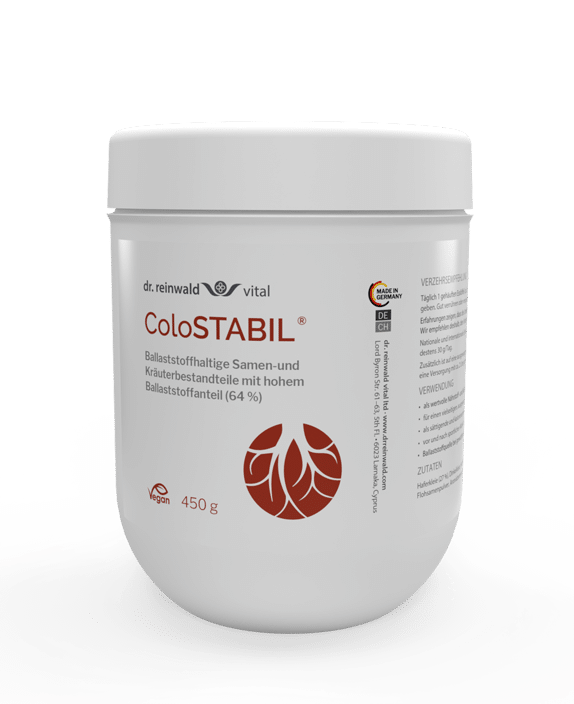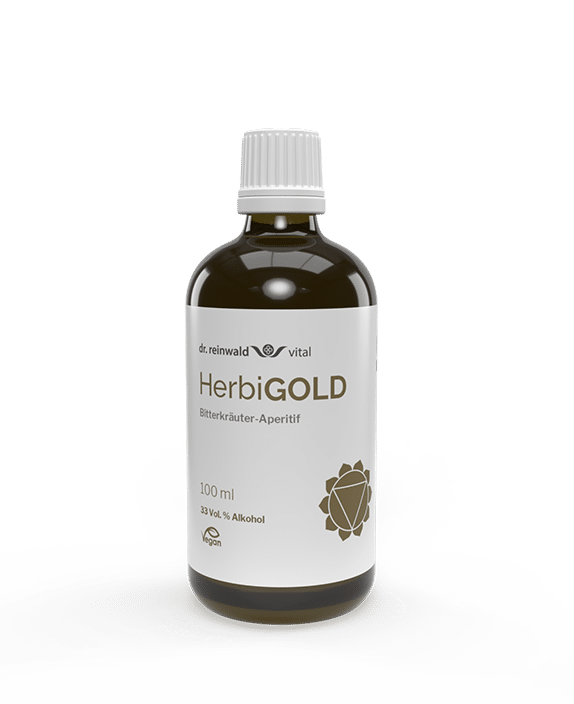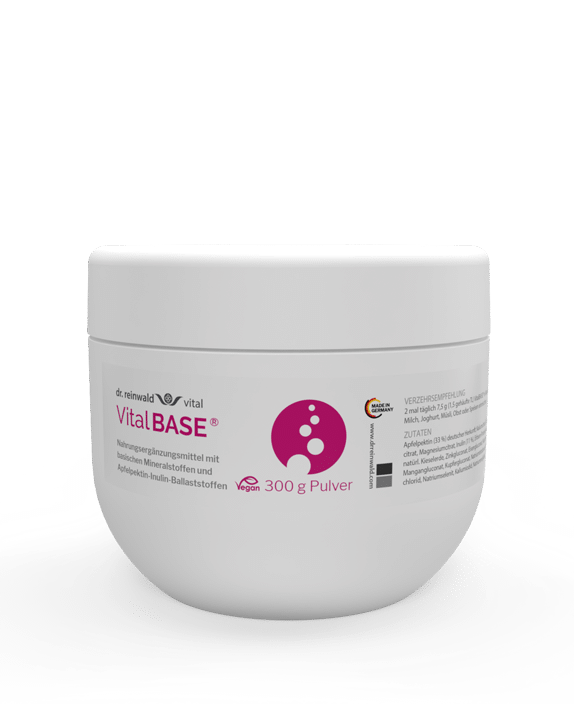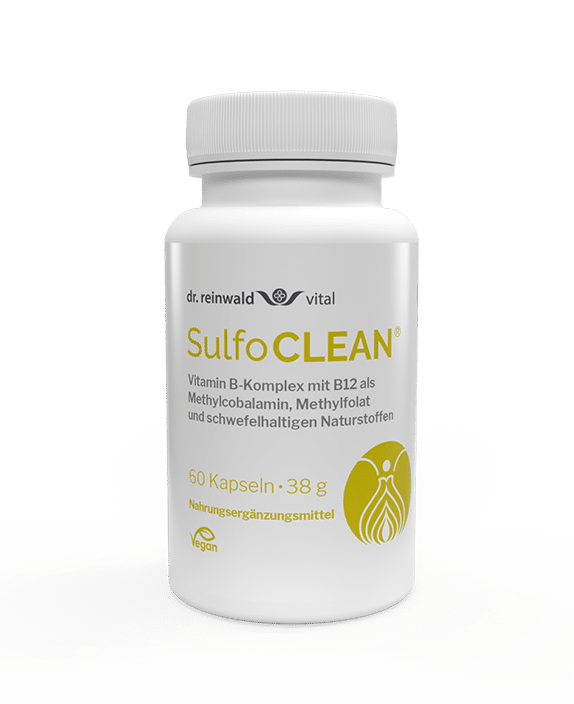Too much or too little stomach acid?
Trust your stomach again with your brains
Who doesn’t know it? The stomach grumbles, the stomach hurts and the intestines send out clear signals! Complaints that each of us experiences from time to time, unfortunately for many of us gastrointestinal problems have become commonplace. The symptoms are manifold, and the number of people affected is alarming. And so about 20 million Germans suffer from chronic complaints and also feel that their quality of life is severely restricted. Reason enough for us to take a closer look at the causes and present you with natural treatment approaches and tips.
Stomach acid – an important digestive aid for our stomach
.
What exactly is gastric acid? Various cells in the stomach mucosa produce two to three litres of digestive fluid every day, the so-called gastric juice. This consists of various components, including water, mucous substances, digestive enzymes, the so-called intrinsic factor (which is important for the absorption of vitamin B12), bicarbonate and hydrochloric acid, i.e. stomach acid.
Our food enters the stomach chopped up and mixed with saliva – depending on our chewing behaviour, well or slightly pre-chewed. But this is not nearly enough preparation for the food components to be optimally broken down and utilised in the further digestive process. And this is where the aggressive stomach acid comes into play: it becomes active as soon as ingested food enters the stomach, but also when we smell a meal or even just think about it.
In response to these stimuli, our gastric epithelial cells, which are special glandular cells in the stomach lining, produce hydrochloric acid and bicarbonate. To prevent the aggressive stomach acid from attacking the stomach itself, there is another important protective mechanism: the gastric mucosa. Bicarbonate is also stored in the mucous membrane, it neutralises the hydrochloric acid and thus also protects the stomach mucosa.
The stomach acid breaks down food into its individual parts and prepares it optimally for further digestion. In the process, important substances are released from the food, for example iron, calcium and vitamins such as vitamin B12.
At the same time, the stomach acid activates the digestive enzymes contained in the gastric juice, which then process the food pulp further. However, gastric acid has another task: it kills microorganisms and bacteria contained in the food. Most pathogens cannot survive such an acidic environment.
You can already see that our digestion is a perfectly coordinated system. Like a big machine, if one cog in the gearbox gets stuck, the whole mechanism comes to a standstill. Or to put it another way: if our food leaves the stomach poorly predigested, it puts a strain on all the other digestive organs, from the intestines to the pancreas to the liver. With sometimes considerable consequences for our health.

When your stomach is acidic: causes and symptoms of hyperacidity
The production of too much stomach acid can have various causes: Constant stress and hectic activity, an unhealthy diet, little exercise, food that is low in nutrients and contaminated with pesticides, the consumption of alcohol, nicotine, the intake of medication but also gastritis caused by the bacterium Helicobacter pylori. In other words, it is almost a challenge not to become over-acidic with our modern lifestyle.
If the blood threatens to become over-acidic, a kind of emergency management takes place: The mucosal cells are called upon to produce alkaline bicarbonate in order to bring the body back into an acid-base balance. Since the accessory cells can only produce bicarbonate and hydrochloric acid, i.e. stomach acid, at the same time, a vicious circle begins. Our body permanently produces too much stomach acid.
A short-term over-acidification of the stomach is usually not a big deal. However, due to a permanent excess of stomach acid, at some point the protective function of the stomach lining also wears off, resulting in so-called hyperacidity, the stomach becomes overacidic.
We notice this in various complaints:
- Heartburn (when the stomach acid does not stay in the stomach, but goes into the oesophagus)
- Acid regurgitation
- Fullness, loss of appetite
- Nausea, vomiting
- Bad breath
- Stomach pain or discomfort
- Damage to the stomach lining such as inflammation or ulcers
- Duodenal ulcer
But at some point this mechanism also breaks down. Due to the constant strain, the stomach cells become tired and block, i.e. they refuse to produce. The result: too little gastric acid is produced in the stomach. And that, too, can have devastating effects on our health.
The unrecognised evil:
From hyperacidity to gastric acid deficiency
Did you know that 80 percent of all Europeans have too little stomach acid? A lack of stomach acid can therefore be the consequence of hyperacidity, but it can also be caused by other factors: long-term use of so-called proton pump inhibitors, i.e. medicines that inhibit stomach acid, chronic type A gastritis in which the immune system attacks the lining cells, or stomach acid production decreases with age.
The lack of gastric acid means that food can no longer be properly broken down in the stomach. This mainly affects protein molecules, which are then no longer broken down sufficiently. In the intestine, the protein digestion disorder leads to a fermentation process in which nitrogen and toxic ammonia are formed. The cell poison not only damages the sensitive intestinal environment so that the “good” intestinal bacteria die off due to the alkaline environment, it can also migrate through the intestinal wall into the bloodstream, reach the liver and ultimately even the brain.
Often a lack of stomach acid also leads to massive deficiency symptoms, for example a vitamin B12 deficiency, which in turn can lead to an iron deficiency and anaemia.
You realise that all this does not sound good and, above all, not healthy. But how does a stomach acid deficiency manifest itself? Unfortunately, the lack of stomach acid and the associated lack of nutrients often lead to diffuse, rather general complaints that we do not even associate with the imbalance in the stomach:
- Bad breath
- Foul-smelling bowel movements or diarrhoea
- A disturbed intestinal flora
- Unspecific digestive complaints such as flatulence or diarrhoea
- Tiredness or even severe exhaustion
- Susceptibility to infections
What can you do about it?
First of all, you should change your lifestyle as soon as possible. Even if it’s hard for you, remember: your body and your health should be worth it.
- Make sure you eat a balanced and healthy diet with lots of fresh food.
- An alkaline-surplus diet consists of 70 to 80 percent alkaline foods and 20 to 30 percent acid-forming foods. Here you will find a nutritional table.
- Lactic acid bacteria are the real heroes when fermentation processes are already underway in your intestines: They can convert ammonia into less toxic ammonium, which can then be broken down relatively well via the liver’s urea cycle.
- Drink enough, preferably good, purified water or unsweetened tea.
- Take enough time to eat and try to eat as consciously and slowly as possible and, above all, to chew well.
- Avoid stimulants such as nicotine, alcohol and sweets.
- Reduce stress in your life: Take time out and take short breaks during the day. Improve your stress management. A relaxation technique such as yoga or Qi Gong can help you to calm down and find your centre.
- Exercise regularly, preferably in the fresh air.
- Take two MyAMINO® about 20 minutes before a meal. These stimulate gastric juice production and set the mood for digestion.
- Avoid taking acid blockers or proton pump inhibitors at all costs. These may alleviate your symptoms in the short term and superficially. However, they do not treat the cause and upset the acid-base balance in your stomach even more, sometimes with far-reaching consequences.
Daily vital companions from dr.reinwald for your stomach
.
If you have had stomach problems for a long time, it makes sense to give your body additional support so that it can regain its balance. You will no longer be able to compensate for the lack of nutrients in your diet alone. Our dr.reinwald vital products are extremely well tolerated and help you to restore the balance in your stomach and replenish your nutrient depot in an effective and gentle way.
- The prebiotic dietary fibres in ColoSTABIL® gently and sustainably bring your intestinal flora back into balance. The bitter substances contained in ColoSTABIL® can work wonders, especially in cases of gastric acid deficiency. They stimulate gastric juice production and thus compensate for the lack of gastric acid.
- Our VitalBASE® with gastric juice-neutral base minerals on a fibre carrier that cleanses the intestines is the perfect balance for a diet with excess acid. The prebiotic dietary fibres apple pectin and inulin additionally calm and strengthen your intestinal flora.
- HerbiGOLD is our herbal bitter with very special properties, as it also contains thujone, among other things. Most bitter substances in nature lack these.
- Our vitamin B complex SulfoCLEAN® supports you with a unique combination of biologically active B vitamins (B12, B6 and folate) and organic sulphur (MSM and wild garlic). This not only covers your vitamin B12 needs, but also supports your detoxification metabolism.
Do you feel addressed? Our friendly team – consisting of therapists and alternative practitioners – will be happy to advise you about our products for your stomach. Call us now or use our chat.




